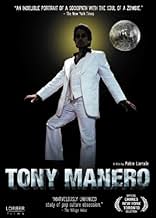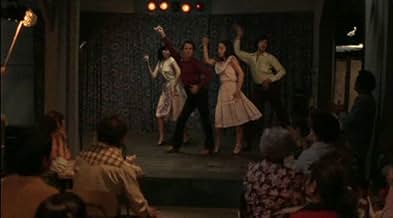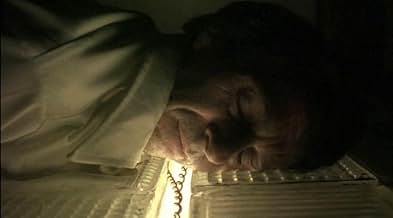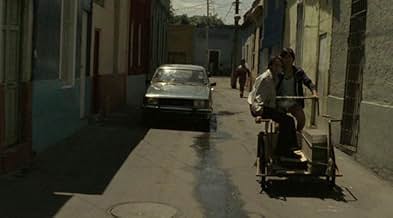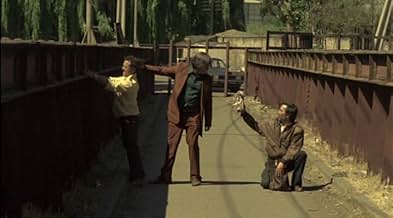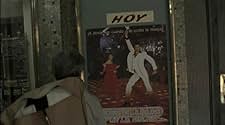IMDb RATING
6.8/10
4.7K
YOUR RATING
A man is obsessed with John Travolta's disco dancing character from Saturday Night Fever (1977).A man is obsessed with John Travolta's disco dancing character from Saturday Night Fever (1977).A man is obsessed with John Travolta's disco dancing character from Saturday Night Fever (1977).
- Director
- Writers
- Stars
- Awards
- 19 wins & 16 nominations total
- Director
- Writers
- All cast & crew
- Production, box office & more at IMDbPro
Featured reviews
Edging to the annual awards season, this year a sure thing is that Chilean director Pablo Larrín will on everybody's radar with his one-two punch NERUDA (Chile's entry for the Best Foreign Language Film) and the formidable JACKIE, a biopic about Jacqueline Kennedy, may win its star Natalie Portman a second Oscar statue as a major player.
So here comes a warm-up to get acquainted with Larrín's previous work, TONY MANERO is his second feature, a sombre take on Chile's darkest time under the Pinochet regime peppered by a less sombre through-line: the 52-year-old protagonist Raúl Peralta's (Castro, Larrín's regular, an Al Pacino doppelgänger both in appearance and affective intensity, also the co-writer of the script) obdurate participation of a TV program "One O'Clock Festival", where a Tony Manero (the lead character in John Badham's Saturday NIGHT FEVER 1977, played by John Travolta) impersonation competition is scheduled in Santiago, 1978.
Examined closely by a hand-held Super 16mm, which intermittently toys with a blurry focus to accentuate the proximity of a sordid milieu, Raúl gives us the first impression of a pallid, taciturn, hangdog loner in the opening scenes where he mistakes the registration date as the actual contest, which will be held one week later. But that facet loses its disguise quickly, when he schematically assaults an old woman who has just been mugged on the street, at her own home, to take away her small boxy color TV set. He is not so much a petty criminal as a ruthless homicide, which ingeniously puts audience at the edge of the seat with a dreadful perturbation whenever he prowls or idles in the dilapidated environs, as violence could be erupted any moment if he sees the opportunity for a monetary gain, whoever the prey is.
Raúl lives with a coterie of amateur dancers in the scruffy house of Wilma (Poblete), where they also occasionally perform to entertain customers. His troupe includes Cony (Noguera), his friend- with-benefit, her adolescent daughter Pauli (Lattus) and Pauli's boyfriend Goyo (Morales). Together they help Raúl to rehearse the John Travola routine, but there is seething tension underneath, Raúl becomes impotent during an overtly explicit rumpy-pumpy, and is mocked by Cony that the only thing can revitalize him is the urge to win the competition, which sours their relationship, Goyo is involved with some surreptitious anti-Pinochet movement, which will put everyone under the interrogation of Pinochet's plainclothes secret police, although Raúl manages to skulk out since it is his big day.
Larrín's tack doesn't shy away from being obstinately provocative, up to an instance of sickeningly scatological malevolence, which seems like an unwarranted feeler to validate its sky's-the-limit artsy taste. But on the other hand, Larrín and his co-writers perspicuously cast a phenomenon of American culture invasion as an escapism for the amoral and the hard-up living under the terror of an autocracy, which indisputably hits the mark of liberating its restrained but astringent political manifesto.
Alfredo Castro is absolutely electrifying to watch from A to Z in the central role, holding Raúl's interior thoughts at bay, but excellently transforms himself onto the screen as a ravishingly volatile monster, with no fear, no conscience, no hold-up can stop his destructive/self-destructive wantonness (as the inauspicious ending dauntingly beckons), who should be answer for this type of societal mutator? The culprit is clear as day in this slam-bang critique of a bygone era weighing heavily on Larrín's fatherland.
So here comes a warm-up to get acquainted with Larrín's previous work, TONY MANERO is his second feature, a sombre take on Chile's darkest time under the Pinochet regime peppered by a less sombre through-line: the 52-year-old protagonist Raúl Peralta's (Castro, Larrín's regular, an Al Pacino doppelgänger both in appearance and affective intensity, also the co-writer of the script) obdurate participation of a TV program "One O'Clock Festival", where a Tony Manero (the lead character in John Badham's Saturday NIGHT FEVER 1977, played by John Travolta) impersonation competition is scheduled in Santiago, 1978.
Examined closely by a hand-held Super 16mm, which intermittently toys with a blurry focus to accentuate the proximity of a sordid milieu, Raúl gives us the first impression of a pallid, taciturn, hangdog loner in the opening scenes where he mistakes the registration date as the actual contest, which will be held one week later. But that facet loses its disguise quickly, when he schematically assaults an old woman who has just been mugged on the street, at her own home, to take away her small boxy color TV set. He is not so much a petty criminal as a ruthless homicide, which ingeniously puts audience at the edge of the seat with a dreadful perturbation whenever he prowls or idles in the dilapidated environs, as violence could be erupted any moment if he sees the opportunity for a monetary gain, whoever the prey is.
Raúl lives with a coterie of amateur dancers in the scruffy house of Wilma (Poblete), where they also occasionally perform to entertain customers. His troupe includes Cony (Noguera), his friend- with-benefit, her adolescent daughter Pauli (Lattus) and Pauli's boyfriend Goyo (Morales). Together they help Raúl to rehearse the John Travola routine, but there is seething tension underneath, Raúl becomes impotent during an overtly explicit rumpy-pumpy, and is mocked by Cony that the only thing can revitalize him is the urge to win the competition, which sours their relationship, Goyo is involved with some surreptitious anti-Pinochet movement, which will put everyone under the interrogation of Pinochet's plainclothes secret police, although Raúl manages to skulk out since it is his big day.
Larrín's tack doesn't shy away from being obstinately provocative, up to an instance of sickeningly scatological malevolence, which seems like an unwarranted feeler to validate its sky's-the-limit artsy taste. But on the other hand, Larrín and his co-writers perspicuously cast a phenomenon of American culture invasion as an escapism for the amoral and the hard-up living under the terror of an autocracy, which indisputably hits the mark of liberating its restrained but astringent political manifesto.
Alfredo Castro is absolutely electrifying to watch from A to Z in the central role, holding Raúl's interior thoughts at bay, but excellently transforms himself onto the screen as a ravishingly volatile monster, with no fear, no conscience, no hold-up can stop his destructive/self-destructive wantonness (as the inauspicious ending dauntingly beckons), who should be answer for this type of societal mutator? The culprit is clear as day in this slam-bang critique of a bygone era weighing heavily on Larrín's fatherland.
THis film sneaks up on you - there is something unsettling and powerful about it. The lead performance is raw, real and sad. This guy is a low street thief who has a circle of whores and other lowlifes around him. It doesn't matter if you know a bit about the horrible regime of General Pinochet who was in power when the film is set - 1978 but the movie is a metaphor for this brutal dictator's control of the country - insane behavior creating insane results. The lead guy is obsessed with Travolta's film Saturday Night Fever - he watches it in a movie theatre endlessly - memorizing the dialogue and all of Travolta's moves and dance steps. A Chile TV Variety show has celebrity look-a-like contests and he was to enter and win the Tony Manero contest - white suit and all. This movie feels like a documentary - and there are moments of calm followed by shocking displays of violence. I can see that this film might not be for everyone but I found it to be incredibly powerful. I disagree with the summary on this page though that describes the guy as a "serial killer" - he is not a serial killer - he just makes sure to get anyone out the way who stands between him and his obsession.
The film, which conveys impressions from a country that is politically and economically collapsed, shows us how martial law situations actually get people out of control psychologically and sociologically rather than creating a control mechanism. You are increasingly watching your character's obsessions about the role model of a psychopathic character and their relationship with other people.
It is a very interesting Chilean film; it has a strange plot and the acting is good; it is a very bizarre experience.
For a hit movie, 'Saturday Night Fever' is a surprisingly bleak and serious film; but not quite as dark as 'Tony Manero', a Chilean movie about a criminal whose life dream is to emulate the character played by John Travolta in the earlier film. Both the anti-hero, and the society he lives in (it's the Chile of Augusto Pinochet) are pretty rotten, and the film cuts neither any slack. Indeed, behind the black comedy, this is a portrait of a civilisation on the brink of collapse through a loss of respect for basic human dignity: the fake Manero desperately seeks dignity for himself in his act, but shows no respect for anyone else's. It's compelling, convincing, and yet, as a story, ever so slightly pointless: 'Satruday Night Fever' had its own redemption narrative, and while one can mock this as Hollywood softening, without any such story a film can seem slightly devoid of direction: it's hard to even imagine what a happy ending would have been for 'Tony Manero', so hopeless is the initial premise. It's still a good film; and fundamentally a political one, even though the politics is all implicit.
Did you know
- TriviaSome clips and tunes from both Saturday Night Fever (1977) and Grease (1978) appear in this film, the most prominent song heard is The Bee Gees' "You Should Be Dancing" from Saturday Night Fever. The final credits acknowledge Paramount Pictures for use of both films in this picture.
- GoofsThe "Members Only" jacket worn by Raul wasn't introduced until 1981, and the film takes place in 1978.
- Quotes
Title Card: [first lines]
Don Enrique: [subtitled version] And now we present our look-alike contest: 'The One O'clock Festival'
Security Guard: Wait here, please.
- ConnectionsFeatured in Sin maquillaje: Alfredo Castro (2011)
- How long is Tony Manero?Powered by Alexa
Details
Box office
- Gross US & Canada
- $20,677
- Opening weekend US & Canada
- $3,305
- Jul 5, 2009
- Gross worldwide
- $687,406
- Runtime
- 1h 37m(97 min)
- Color
- Sound mix
- Aspect ratio
- 1.85 : 1
Contribute to this page
Suggest an edit or add missing content


